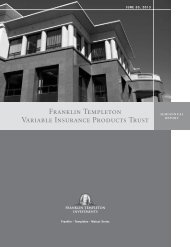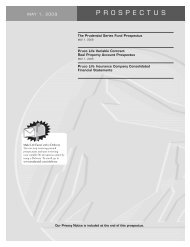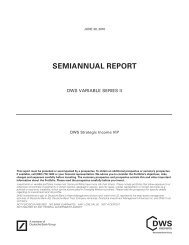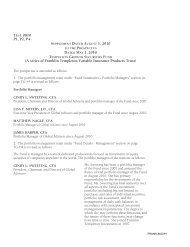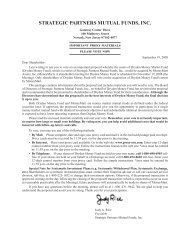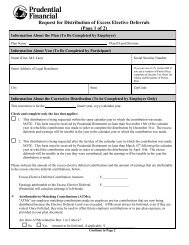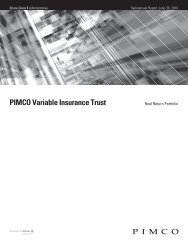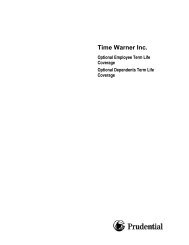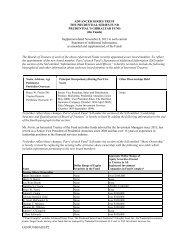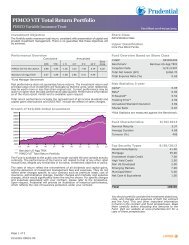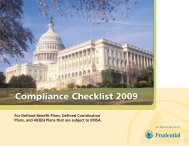Prudential Premier Retirement Variable Annuities
Prudential Premier Retirement Variable Annuities
Prudential Premier Retirement Variable Annuities
You also want an ePaper? Increase the reach of your titles
YUMPU automatically turns print PDFs into web optimized ePapers that Google loves.
Taxes Payable by Beneficiaries<br />
The Death Benefit options are subject to ordinary income tax to the extent the distribution exceeds the cost basis in the contract.<br />
The value of the Death Benefit, as determined under federal law, is also included in the Owner's estate for federal estate tax<br />
purposes. Generally, the same tax rules described above would also apply to amounts received by your Beneficiary. Choosing an<br />
option other than a lump sum Death Benefit may defer taxes. Certain minimum distribution requirements apply upon your death, as<br />
discussed further below in the Annuity Qualification section. Tax consequences to the Beneficiary vary depending upon the Death<br />
Benefit payment option selected. Generally, for payment of the Death Benefit<br />
▪ As a lump sum payment: the Beneficiary is taxed in the year of payment on gain in the contract.<br />
▪ Within 5 years of death of Owner: the Beneficiary is taxed as amounts are withdrawn (in this case gain is treated as being<br />
distributed first).<br />
▪ Under an annuity or annuity settlement option with distribution beginning within one year of the date of death of the Owner:<br />
the Beneficiary is taxed on each payment (part will be treated as gain and part as return of Purchase Payments).<br />
Considerations for Contingent Annuitants: We may allow the naming of a contingent Annuitant when a Nonqualified Annuity<br />
contract is held by a pension plan or a tax favored retirement plan, or held by a Custodial Account (as defined earlier in this<br />
prospectus). In such a situation, the Annuity may no longer qualify for tax deferral where the Annuity contract continues after the<br />
death of the Annuitant. However, tax deferral should be provided instead by the pension plan, tax favored retirement plan, or<br />
Custodial Account. We may also allow the naming of a contingent annuitant when a Nonqualified Annuity contract is held by an<br />
entity owner when such contracts do not qualify for tax deferral under the current tax law. This does not supersede any benefit<br />
language which may restrict the use of the contingent annuitant.<br />
Reporting and Withholding on Distributions Taxable amounts distributed from an Annuity are subject to federal and state<br />
income tax reporting and withholding. In general, we will withhold federal income tax from the taxable portion of such distribution<br />
based on the type of distribution. In the case of an annuity or similar periodic payment, we will withhold as if you are a married<br />
individual with three (3) exemptions unless you designate a different withholding status. If no U.S. taxpayer identification number<br />
is provided, we will automatically withhold using single with zero exemptions as the default. In the case of all other distributions,<br />
we will withhold at a 10% rate. You may generally elect not to have tax withheld from your payments. An election out of<br />
withholding must be made on forms that we provide. If you are a U.S. person (including resident alien), and your address of record<br />
is a non-U.S. address, we are required to withhold income tax unless you provide us with a U.S. residential address.<br />
State income tax withholding rules vary and we will withhold based on the rules of your State of residence. Special tax rules apply<br />
to withholding for nonresident aliens, and we generally withhold income tax for nonresident aliens at a 30% rate. A different<br />
withholding rate may be applicable to a nonresident alien based on the terms of an existing income tax treaty between the United<br />
States and the nonresident alien's country. Please refer to the discussion below regarding withholding rules for a Qualified Annuity.<br />
Regardless of the amount withheld by us, you are liable for payment of federal and state income tax on the taxable portion of<br />
annuity distributions. You should consult with your tax advisor regarding the payment of the correct amount of these income taxes<br />
and potential liability if you fail to pay such taxes.<br />
Entity Owners<br />
Where a contract is held by a non-natural person (e.g. a corporation), other than as an agent or nominee for a natural person (or in<br />
other limited circumstances), the contract will not be taxed as an annuity and increases in the value of the contract over its cost<br />
basis will be subject to tax annually.<br />
Where a contract is issued to a Charitable Remainder Trust (CRT), the contract will not be taxed as an annuity and increases in the<br />
value of the contract over its cost basis will be subject to tax annually. As there are charges for the living benefits described<br />
elsewhere in this prospectus, and such charges reduce the contract value of the Annuity, trustees of the CRT should discuss with<br />
their legal advisors whether election of such living benefits violates their fiduciary duty to the remainder beneficiary.<br />
Where a contract is issued to a trust, and such trust is characterized as a grantor trust under the Code, such contract shall not be<br />
considered to be held by a non-natural person and will be subject to the tax reporting and withholding requirements generally<br />
applicable to a Nonqualified Annuity. At this time, we will not issue an Annuity to grantor trusts with multiple grantors.<br />
At this time, we will not issue an Annuity to a grantor trust where the Grantor is not also the Annuitant. Where a previously issued<br />
contract was structured so that it is owned by a grantor trust but the Annuitant is not the grantor, then the contract is required to<br />
terminate upon the death of the grantor of the trust if the grantor pre-deceases the Annuitant under Section 72(s) of the Code.<br />
Under this circumstance, the contract value will be paid out to the Beneficiary and it is not eligible for the death benefit provided<br />
under the contract.<br />
116



